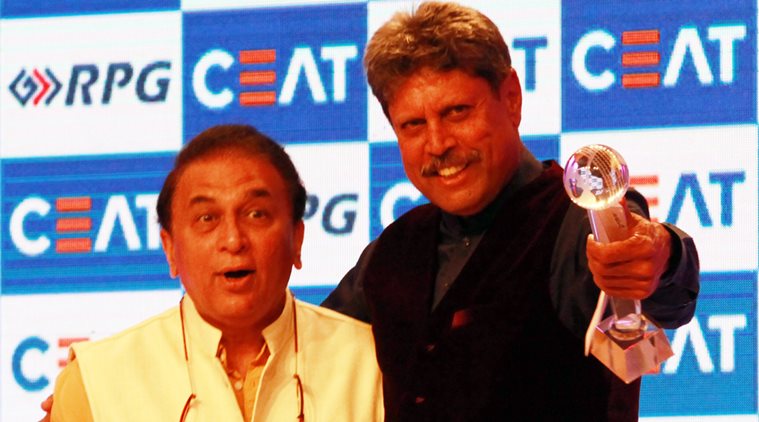Stay updated with the latest sports news across Cricket, Football, Chess, and more. Catch all the action with real-time live cricket score updates and in-depth coverage of ongoing matches.
Sunil Gavaskar, Kapil Dev question Lodha panel recommendations
Sunil Gavaskar, Kapil Dev have criticised the ‘one state, one vote’ policy and the restricted tenures of officials as suggested by Lodha panel.
 The two former captains were in agreement over the fixed tenures that Lodha panel had recommended for anyone vying for a post in BCCI. FILE
The two former captains were in agreement over the fixed tenures that Lodha panel had recommended for anyone vying for a post in BCCI. FILE
Sunil Gavaskar and Kapil Dev, two of the biggest names in Indian cricket, have come out in support of the BCCI and challenged some of the more significant recommendations of the Lodha committee.
Talking on the sidelines of India’s historic 500th Test in Kanpur, the two legends have criticized the ‘one state one vote’ policy and also the restricted tenures of officials in the board as suggested by the Supreme Court appointed committee led by Justice RM Lodha. While Dev, one-time highest wicket-taker in Test cricket, has felt that some of the recommendations were ‘too much’, Gavaskar, the first man to cross the 10,000-run barrier in Tests, has asked for the BCCI to reflect the setup of a cricket team with a blend of youth and experience.
WATCH VIDEO: Supreme Court Warns BCCI Over Lodha Report : Here’s What The Court Said
According to the Lodha recommendations, Maharashtra and Gujarat, home to three separate cricket associations each, should get a single vote in the BCCI on a rotational basis.
But after insisting that he ‘could not understand’ it, Dev felt that the ‘one state one vote’ policy could disturb the long-standing status quo of cricket administration in the country, and not positively at that. “I could not understand that Maharashtra can have only one vote. How can a place like Mumbai which has done so much for cricket can vote only after three years?” he said.
READ: Before doomsday comes judgement day
Gavaskar on the other hand wasn’t in favour of every state in the country getting a ‘direct entry’ into the country’s top-tier domestic tournaments just by virtue of being in India, which is one of the other recommendations of the Lodha committee which felt that not everyone in the country had a fair opportunity play cricket at the highest level. He pointed out examples in England and Australia, where only a fair share of the counties and states respectively play in their premier competitions.
“If you go to England, you will find that not every County plays the English County Championships. Not every state plays in Australia’s first-class championship (Sheffield Shield). Therefore, to have every state play Ranji Trophy is going to dilute the level of cricket and not help us at the international level,” he said.
READ: The Green Park pointer: Death of Test cricket is grossly exaggerated
The former India captain did, however, acknowledge that the chance to play in the Ranji Trophy should rather be merit-based. “What is being done at the moment where teams play junior level is if you do well you get promoted. Like Chhattisgarh did well at junior level, therefore they have been promoted and that is the way to go,” he said.
Gavaskar also sided with his former India teammate’s criticism of the ‘one state one vote’ suggestion stating that it would be ‘hard on the founding members of the board’. The two former captains were also in agreement over the fixed tenures that Lodha and his colleagues, former Justices Ashok Bhan and R Raveendran, had recommended for anyone vying for a post in the BCCI.
PHOTOS: India six wickets away from 1-0 lead in Test series against New Zealand
Gavaskar, who himself had been given the reins of the BCCI and named interim president by the Supreme Court in 2014 to look into IPL matters, questioned the three-year cooling off period and listed a number of issues that could arise from it being implemented. “What is the pinnacle in an administrator’s career? It is becoming the President. You don’t just become the President in three years. You are the President because you serve some terms as vice-president. Once you come to that level, you become President,” he said. “Once you have done that, you don’t come back as the representative of your association as how are the new ideas going to come? How are contemporary ideas going to come? Once you do that, we should say thank you very much. Let us now have somebody else representing my association.”
Dev insisted that three years wasn’t a long enough period and ‘too quick’ to make a difference. “I think three years for anybody (is harsh), it should be minimum five years. I think if you appoint national selectors, they come to know by that time. Minimum five years sounds very good. Three years is too quick,” he said.
































